My mother used to make upma for breakfast 2 or 3 times a week when I was growing up. I can’t blame her, with four children, making them to get ready for school in the morning; I don’t know how she even found time to prepare breakfast. Upma is easy to prepare, filling and nutritious. During marriages upma is the standard breakfast item in our area and tastes completely different from that of home made one, I have to say much better. Now I know the secret, measurements of ghee and oil were equal to the upma rava quantity. No wonder it tasted so good. But at home, my mother was always conservative in use of ghee/oil in upma, unconsciously healthy. I didn’t appreciate that back then, but now I do.
Recipe:
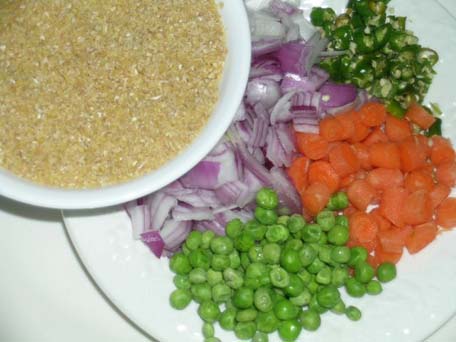
2 cups of semolina or suji or cracked wheat and 4 cups of water
(suji:water always in 1:2 ratio)
1 onion, 2 green chillies, 1 carrot, small piece of ginger
– all cut into small pieces
Half cup of fresh peas
Handful of roasted cashews or peanuts
For popu or tiragamata: 1 tsp each – urad dal, chana dal, minced garlic, curry leaves, cumin and mustard seeds.
If you are going to prepare upma with fine semolina or suji, roast them slowly till the color changes from cream to light gold. This process makes them not only more tasty, it also allows the grain to thoroughly mix with water without forming any lumps. For cracked wheat, bulgar because of large size of the grain, this step is not necessary. But roasting always adds some extra flavor so do it if you can spare some time.
Preparation:
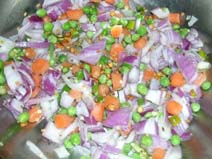
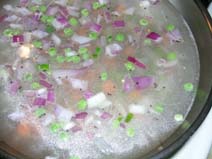
Heat 2 tsp of oil in a pan, add popu ingredients in the order listed. Popu is a must for upma. When fried in oil, urad dal and chana dal bring cruchy nuttiness, garlic and curry leaves add some sweet fragrance, where as cumin and mustard seeds some essential oils and health benefits.
When mustard seeds start to jump around, then quickly add onions, green chillies, ginger, carrot and peas. Saute them to tender. Sometimes, I also add other vegetables like potato, bell peppers and tomato to make it more rich and nutritious. You can change the vegetables and create numerous varieties of upma. Do not be afraid to experiment. Upma is a very forgiving recipe.
Add 4 cups of water and 1 teaspoon of salt. Mix. Close the lid and bring the water to a boil on high heat.
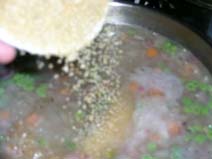
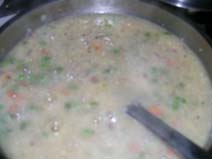
Once the water starts boiling, reduce the heat. Pour the upma ravva (suji, semolina, or cracked wheat) slowly, stirring continously with a spoon, to prevent the lump formation.
Also add the toasted cashews or peanuts. On reduced heat, cook the upma covered, untill all the water is absorbed and upma becomes soft and smooth like porridge. Turn off the heat and let it sit for few more minutes, covered.
Serve warm with lime/lemon juice sprinkled to taste. Have delicious upma with pickle (mango or lemon) or with chutney (coconut or peanut).
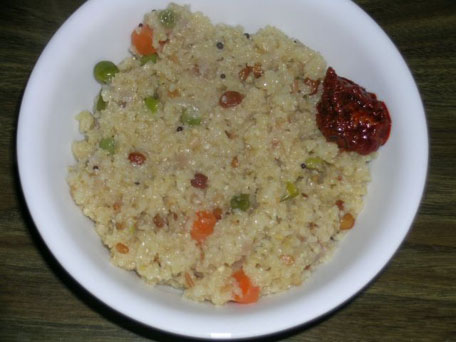
Upma with Mango Pickle. Traditionally a breakfast, but now at my home, a quick filling meal on a weekend or on a busy day.
